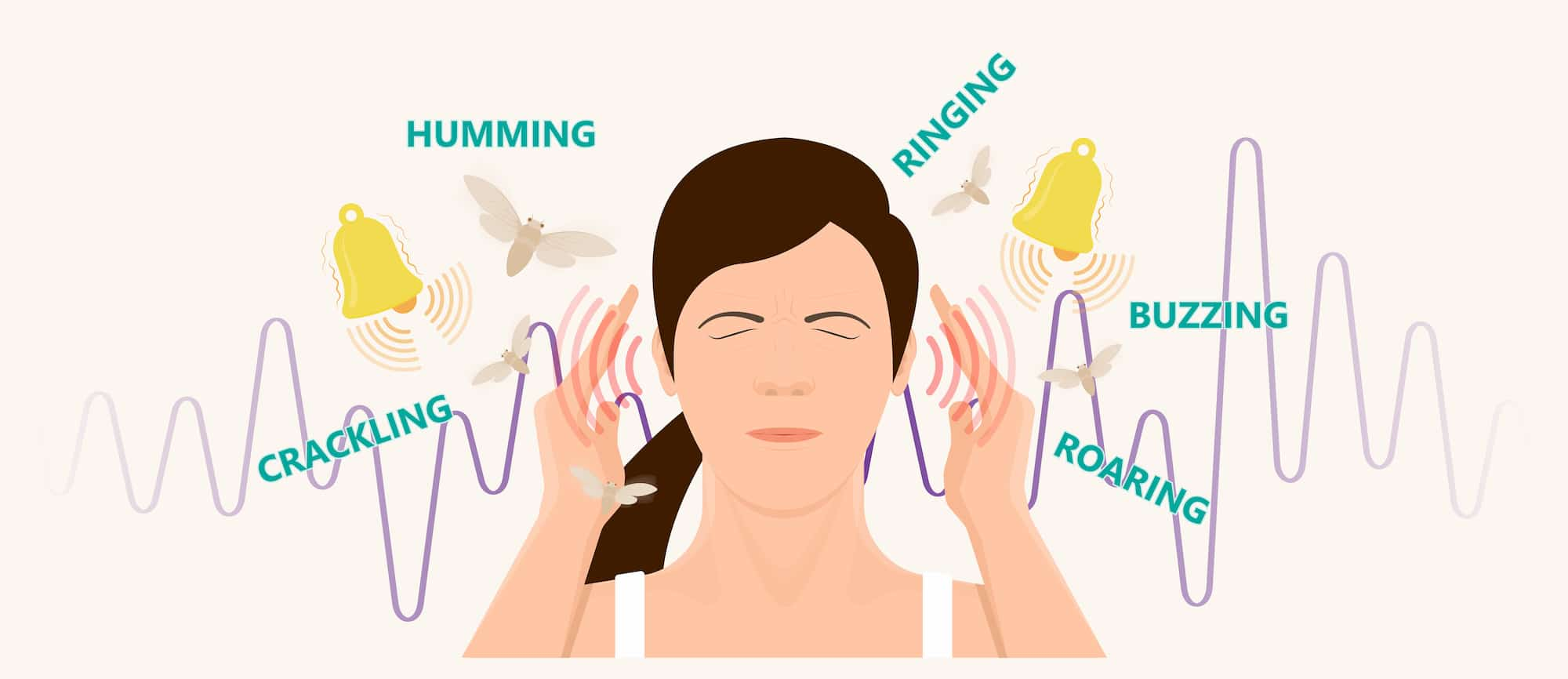Back
Tinnitus Symptoms and Treatment
By Dr. Zarina Vitebsky, DPT, MSPT, PRPC, TPS, LPF, DN on 1/16/2023

Have you ever gone to a loud concert & left with that annoying ringing in your ears? It usually goes away within a few hours, right? Now, imagine that ringing noise, 24 hours a day, 7 days a week, 365 days a year. That’s what people who are living with tinnitus deal with every single day; they don’t know true silence, & for some, it’s mentally & emotionally crippling.
Tinnitus: What Is It?
According to the National Institute on Deafness and Other Communication Disorders (NIDCD), tinnitus is described as, “a ringing in the ears, but it also can sound like roaring, clicking, hissing, or buzzing. It may be soft or loud, high pitched or low pitched.” Tinnitus may also affect one or both ears, & approximately 10% of the adult population in the U.S. has experienced an episode of tinnitus, lasting for about 5 minutes in the past year, which equates to roughly 25 million Americans (as of 2017).
What Causes Tinnitus?
There are several causes for tinnitus, but let’s take a look at what causes that ringing noise. So, your auditory system includes your ear, & the auditory nerve connects the inner ear to your brain and the parts of your brain that process sounds. Something as simple as earwax blocking the canal could potentially cause tinnitus, but according to the NIDCD, there are number of health conditions that can contribute to it:
Noise-induced hearing loss
i.e. long exposure to noisy environments (construction workers, musicians, members of the military, etc).
The NIDCD states that noise-induced tinnitus is one of the most common service-related disabilities among veterans returning from Iraq and Afghanistan.
Ear and sinus infections
Diseases of the heart or blood vessels
Ménière’s disease
An inner ear disease that causes episodes of vertigo
Brain tumors
Hormonal changes in women
Thyroid abnormalities
It is also important to note that tinnitus is NOT a disease, it is a symptom and our body’s way of alerting us that there is dysfunction within our auditory system. There is also a list of over 200 medications that are known to cause tinnitus when you start or stop taking them.
Different Types of Tinnitus:
Subjective: this is the most common form of tinnitus. Subjective symptoms can only be heard by the affected individual & are usually caused by exposure to excessive noise. This type of tinnitus can appear & disappear suddenly, & may last 3–12 months at a time. In some severe cases, it may never stop.
Objective: Usually caused by a disorder, such as Meniere’s disease, that primarily affects the brain’s auditory functions.
Somatic: This form of tinnitus is caused, worsened, or otherwise related to the sensory system.
Pulsatile: A rare form of tinnitus that may be caused by involuntary muscle contractions or vascular deformities. When the cause is treated, the tinnitus usually stops entirely. This is the only form of tinnitus that can be heard by an outside observer, & the only type that has the potential for a permanent fix.
Why Do I Have the Ringing Noise in My Ears?
So, despite you hearing the ringing in your ears, the noise is not actually coming from the ears themselves. The source of the noise comes from a network of brain cells, that scientists call “neural circuits,” that decipher & make sense of the sounds our ears hear. Scientists still have yet to agree upon exactly what happens within our brain to create the illusion of sound when there is none; some think that tinnitus is similar to chronic pain syndrome, in which the pain persists even after a wound or broken bone has healed.
Tinnitus could also be the result of the brain’s neural circuits trying to adapt to the loss of sensory hair cells within the ear by increasing the sensitivity to sound. This would explain why some people with tinnitus are overly sensitive to loud noises.
Another potential cause of the ringing/buzzing could be the neural circuits getting thrown out of balance when damage inside the inner ear causes changes to the signaling activity in the auditory cortex, which is the part of the brain that processes sound. Or it could be the result of abnormal interactions between neural circuits.
Can Physical Therapy Help with Tinnitus or Tinnitus Symptoms?
The short answer is, yes! Physical therapy can absolutely contribute to relief of tinnitus symptoms. There are various studies that state dysfunction in the cervical spine & jaw such as TMJ can contribute to tinnitus symptoms, & when treated by a Physical Therapist, patients have reported significant improvements in their symptoms. But, it all depends on which type of tinnitus the patient has, & if they have dysfunction in the jaw or neck. We as Physical Therapists are able to treat the neck/jaw issues, which studies have shown can lessen/improve tinnitus symptoms, if the patient is experiencing things like TMJ in conjunction with the tinnitus.
Tinnitus has a strong correlation with LBP and pelvic floor dysfunction due to increased tension throughout the body.
If you’re experiencing tinnitus symptoms, reach out to us here at the Pelvic Health Center in Madison, NJ to set up an evaluation & assessment of your body mechanics/posture to see if we can help provide some relief! Feel free to call us 908-443-9880 or email us at contact@pelvichealthnj.com.
Read More:
How Chronic Pelvic Congestion in Men Contributes to Prostatitis By Shannon Strauch, PTA, STMT-1 on 12/11/2024 How lymphatic issues can cause symptoms of prostatitis Prostatitis and Tight Pelvic Floor Muscles: A Comprehensive Guide By Shannon Strauch, PTA, STMT-1 on 12/10/2024 How a tight pelvic floor can be the reason for prostatitis symptoms
Are you ready to live pain free?
Request An Appointment